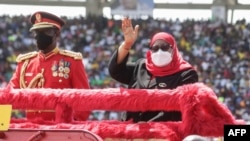Tanzanians this week are marking their 60th anniversary of independence from Britain. The country has been more stable than its East African neighbors and never experienced a coup. But after decades of rule by the dominant Party of the Revolution, some activists are demanding a new constitution to better reflect Tanzania’s multiparty political system.
Eighty-year-old Paul Letara recalls Tanzania's independence in 1961, and says his life today is better than back then, though not for everyone.
He says when we got independence, things were not good because our president struggled a lot when fighting for independence. There was not that much development, but as time went on, at least there was progress — but very minimal, there were still no good roads and few schools. Currently, Lerata adds, things have changed but still Tanzanians are struggling with their lives.
One thing that hasn’t changed is the ruling party. Since 1961 Chama Cha Mapinduzi, or the Party for Revolution, has dominated Tanzania’s political landscape.
Its leaders believe the ruling party is the only one capable of developing the country.
Samia Suluhu Hassan, Tanzania’s president, is among the defenders of that belief.
She says during the sixty years of independence within mainland Tanzania, many big things have been done. All the leaders have done many big things depending on the economic, political and financial situation at that time. So, Hassan adds, fortunately all the transformations were made by the government ruled by the Chama Cha Mapinduzi party.
Analysts say the current constitution enables the ruling party to continue its “overwhelming” dominance. The president appoints election officers, the chief judge and other top decision-makers.
Critics say those officers are almost certain to side with the ruling party in any disputes.
Peter Madeleka, a political analyst, says there is some institutional inertia at play.
He says to remain in power for a political party, particularly the ruling CCM, is one thing, but to continue remaining in power is another thing because Tanzania’s constitution says Tanzania will be a free, democratic country that follows a multiparty system. Unfortunately, he says, when Tanzania shifted into a multiparty system, the constitution that was formed under a single party system remained, so there are some weaknesses. Those weaknesses, Madeleka adds, in his opinion favor the ruling party to continue in power.
Rights activists and the opposition Chadema party have called for an update to the constitution, which was passed in 1977.
But some Tanzanians like Thomas Meshuko say they don’t care about how long the party remains in power, as long as Tanzania remains peaceful.
I’m proud to be Tanzanian, Meshuko says, because Tanzania is a country at peace, we thank God, since before and after independence despite being many things that have happened in the world, including wars.
While Tanzanians have a lot to be happy about after 60 years of independence, the founding fathers’ dream of a country where inclusion underpins its political sphere has not been realized, according to some.
When and if it happens, 80-year-old Paul Letara says he hopes to be around for all the changes.




